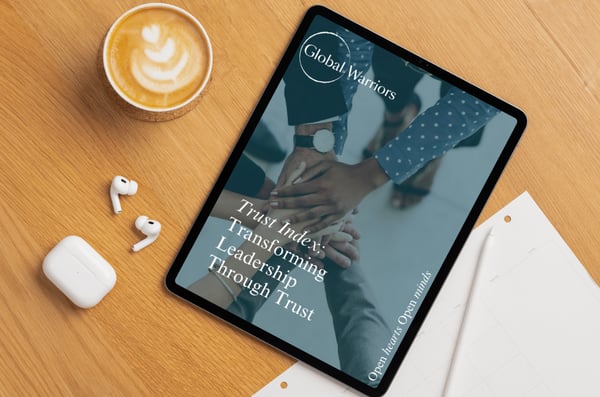“Out beyond ideas of wrongdoing and right doing, there is a field. I’ll meet you there”. Rumi
Central to our work at Global Warriors is the creation of courageous cultures. We know deep in our bones that when we show up without fear of negative consequence, magic happens. It is in this place that we innovate, challenge, support and grow.
Why then is it so hard for many organisations to create workplaces that encourage people to show up, be seen and have a voice?
As warriors, we knew that we needed to continue doing our own work around this. Integrity and congruence matter to us and, like the businesses we serve, we too have our own edges around creating a courageous culture.
We’ve been doing a deep dive into psychological safety. We began our journey by looking at the research and we chose to lean into Amy Edmondson’s definition of psychological safety:
“A belief that one will not be punished or humiliated for speaking up with ideas, questions, concerns or mistakes.”
The definition helps identify the root of psychological safety – our individual belief systems. Our belief systems are shaped by many factors including our families, communities, institutions, social norms, historical forces and spirit. Don Miguel Ruiz states that our beliefs become like books of the law in our heads, and we judge ourselves and others according to these.
How our beliefs shape our lives
Take this example. If I hold a belief that it’s not safe to speak truth to power, I may see that as fact. Imagine that I grew up in a household where I was encouraged to respect my elders and those in authority. It’s possible I would have then gone out into the world with a subservience or deference threshold. This may have been reinforced through the education system that I experienced and if so, it is likely that over time, I will have gathered evidence to affirm that belief as true, and it will have become a fixed viewpoint.
If I experienced instances where authority figures used their power to silence me, I may have developed even stronger neural pathways that guide me when I feel the urge to speak or express my intuition, i.e., that it is actually safer to remain silent.
If the organisation I work in wants to encourage me to speak up and share my truth, I would need to be motivated to rewire my belief, and the organisation would need to demonstrate that it truly valued truth-telling for me to decide that the transformation was worthwhile.
All part of being human
As human beings we share fundamental needs: to be seen and heard, to be loved and belong, and to be validated. We assume that we know how to get our needs met in healthy ways. But unless it was modelled for us, we can find ourselves caught in defensive, dysfunctional patterns of behaviour. These defensive behaviours are often unconscious and can be overt (control, power, competitive, perfection) or covert: (conformance, appeasing, avoidance, dependence). They become our modus operandi; the way we believe we need to operate in order to succeed.
If we want to practise – and experience – psychological safety we need to dig in and do the work at different levels: individually, in teams and organisationally.
As individuals
Being open to the possibility that there may be a better way to work and be together, calls us to do our own inner work. It’s about making the unconscious conscious. This involves deeply examining how we show up and understanding what drives our reactive tendencies and behaviours. It requires us to be open to healing the wounds or ‘shaping’ that have created our unconscious defensiveness in our leadership.
As teams
When Google conducted their “Project Aristotle” in 2015, they found that successful teams had 5 common elements: psychological safety, dependability, structure and clarity, meaning and impact of work. Psychological safety was found to be the most critical factor and enabled the other four factors. However, Ipsos, 2012 found that 47% of employees worldwide described their workplaces as psychological safe and healthy.
Team psychological safety (TPS) is a shared belief that people feel safe about the interpersonal risks that arise concerning their behaviours in a team context (Edmondson, 2018). We believe that talking openly about the type of culture we want to create together, and how we will do that together, is just as important as focusing on the tasks and outcomes we desire.
If we want to create teams where it is safe to dissent, be embarrassed and make a mistake, it matters that we can also discuss and agree how we are going to be together when we feel ‘triggered’ and our defences are up. And it really matters that we develop our ability to be open and willing to practise these agreements around positivity and productivity together.
Let’s face it, it’s easy to go through the motions of defining agreements without having the tenacity and courage to hold ourselves accountable. If we say we want to be honest and speak our truth and we sense that we are not doing this, we need to call it out in a way that invites curiosity and learning – not judgment or blame.
As organisations
When we adopt a systemic lens, we can explore how the broader collective works together to achieve its mission. One of the questions we can invite is whether the organisational levers that we pull, successfully support psychological safety.
For example, there may be many different feedback loops, but is it really okay to say that we are not okay without fear of retribution? Can we point out biases and privilege without it being career limiting? Do our pay and reward systems encourage and reinforce the behaviours and values we espouse? Competency frameworks and job evaluations help prevent bias and reinforce safety, but have we honestly looked at them through the lived experience of our people? Do they really deliver?
Can we really call upon our courage to do something that frightens us? Whether that’s
- individually, to be honest and ask how we get in our own way of speaking up,
- Within the team, to name the elephants with love and compassion, and to innovate and have healthy conflict that moves the dial forward
- Or organisationally, to consider the whole system and whether it encourages the heartbeat of the organisation to play out loud to the rhythm of its mission?
In Global Warriors we are committed to doing our work. We are willing to begin again. We sense intuitively when things aren’t working, and we convene conversations that rumble in the darkness and discover the light. One thing we know is that psychological safety means different things for each of us, so there needs to be respect for wherever people may be at on the continuum. It is not easy, and we don’t always get it right. And yet we are committed to stay in the learning zone.
Building that capacity to stay involves standing in the fire and leaning fully into the tools and practices that we teach. This is what gives us the courage to talk about love and leadership simultaneously in the workplace. We know that a new way is possible, and we see the green shoots.
If you, your team or organisation sense that there’s a better, bolder, more real way to do your work together and you want to be better together, here is our invitation:
Ask yourself:
- What risks am I, and are we taking?
- Where are we stuck going through the motions?
- Where is my / our energy being wasted in our attempts to defend ourselves?
- What (beliefs, attitudes, behaviours) do I / we need to liberate to free myself and others up to not be afraid of each other and have voice?
We would love to meet you, your team and organisation in the field out there. We live for helping people and organisations, who care deeply about their work and their impact, to be courageous individually and collectively.
If this speaks to your heart, contact us. We’d love to hear your story.
Related content

Global Warriors Trust Index: Transforming Leadership through Trust
At Global Warriors, we believe trust isn’t a nice-to-have—it’s the foundation of...

The Courage of Authenticity: Shine Your Own Way
In the intricate journey of our professional and personal lives, there's a profound...

Women's Leadership Development Programs: Fostering Long-Term Success After an Organisational Restructure
Women's Leadership Development Programs: Fostering Long-Term Success After a Restructure
